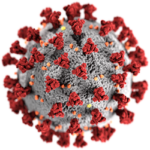
Normally there is an editorial from Mayor Joseph A. Curtatone in this space, but this week the city is instead sharing important information about Novel Coronavirus.
Novel coronavirus (also known as COVID-19) is a virus that emerged in December 2019 in China. Like the flu, it is a respiratory disease, meaning it primarily affects the lungs. While some cases can be mild, some people may develop more serious complications, and in some cases the virus can be fatal. Currently, worldwide, approximately 2% of cases have resulted in death.
While federal health officials have publicly announced that they expect COVID-19 Novel Coronavirus to spread in the United States, they still consider the current threat in the country and Massachusetts to be low. As of midday March 3, Massachusetts has had one confirmed case of COVID-19 and one likely case that still needs to be confirmed by the Centers for Disease Control (CDC).
Although risk in Massachusetts is considered low, there are still a number of things that community members can do to protect their health and prepare in the event that the virus spreads.
- Reduce the spread of germs. Be sure that you are fully informed of standard flu protocols — and commit to truly following them. Precautions such as staying home if you feel sick, washing hands frequently and thoroughly, and covering your cough or sneeze with a tissue or your elbow are designed to prevent the spread of germs.
- Prepare an emergency kit. An emergency kit is a collection of items you may need in an emergency including non-perishable food, water, medications, pet food, and important documents. At all times, not simply as it relates to COVID-19, every household should have an emergency kit ready to be prepared for any unexpected emergencies. Kits generally include essentials to cover a 3-day period. With the COVID-19, it is recommended to consider a 2-week supply. You can find more information on building an emergency kit at www.mass.gov/mema.
- Do not hoard. While it is advisable to plan and prepare for your general emergency needs and possible quarantine, it is detrimental to overall public health if people hoard more resources than they need. For example, if one person hoards more hand sanitizer than they can use alone, there may other people who will not have access and then may be more likely to spread germs to everyone, including the hoarder.
- Check travel alerts before traveling. We encourage anyone planning to travel to review the latest travel guidance on the CDC’s website, www.cdc.gov, which is updated frequently. As of March 3, there are warnings and alerts of various levels for China, South Korea, Japan, Italy, Iran, and information posted regarding Hong Kong. Pack photocopies of your travel documents, I.D.’s/passport, and proof of health insurance.
- Stay informed. Check respected news sources frequently. Bookmark the City’s coronavirus webpage for local updates: www.somervillema.gov/coronavirus. Sign up for City alerts or check your subscription to be sure you are signed up to receive alerts via every method you can receive: phone, email, texts. Sign up for alerts at www.somervillema.gov/alerts or call 311 for assistance subscribing.
- Share facts, not rumors. Check the www.cdc.gov, or the Massachusetts Department of Public Health at www.mass.gov/covid19, or other official government sites for official updates and the facts.
- Stay compassionate. Consider offering to help any elderly neighbors or others who may need assistance in preparing. There have also been news reports of persons of Asian backgrounds experiencing incidents of discrimination due to COVID-19 news. No one should face discrimination or mistreatment based on a public health situation. Viruses do not discriminate.
The city and Somerville Public Schools will continue to post updates at www.somervillema.gov/coronavirus as more information becomes available.















Reader Comments